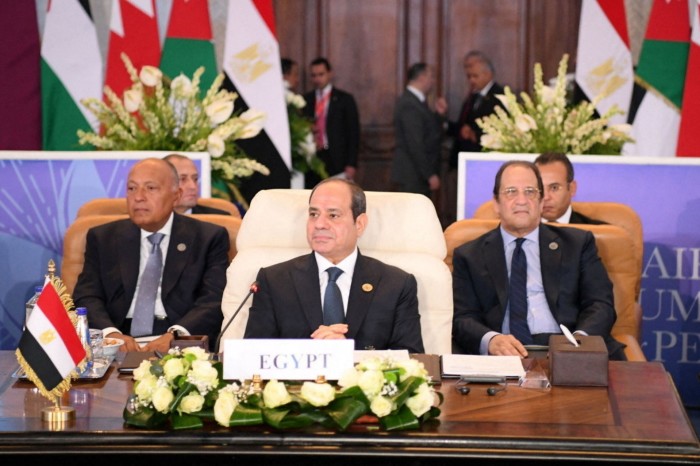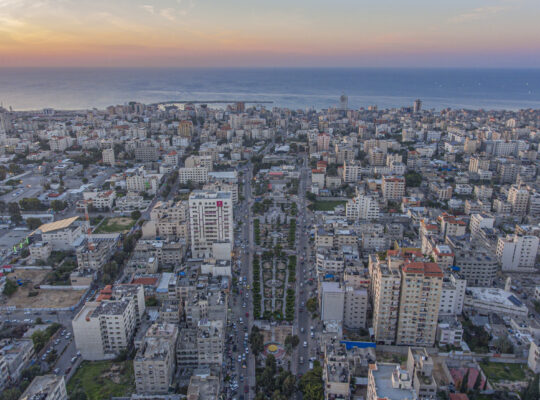[ad_1]
A small convoy of international aid entered Gaza on Saturday morning, hours after two US hostages were released by Hamas after mediation from Qatar.
Some 20 trucks carrying medicines and canned food entered the southern Gaza Strip via the Rafah crossing from Egypt after days of intense diplomatic negotiations, several officials said.
Israel has demanded that any aid entering Gaza should be inspected for weapons and their contents kept out of the hands of Hamas.
The UN was “working with the Israeli authorities and inspection regime for goods going into Gaza,” according to spokesman Stéphane Dujarric.
“All supplies were inspected before being brought into Gaza,” Israel’s COGAT agency, which implements Israeli policy in the Gaza Strip, said in a statement.
Cindy McCain, executive director of the UN World Food Programme, said the convoy comprised nine UN trucks and 11 from the Egyptian Red Crescent.
The WFP has sent in 60,000 metric tonnes of food — enough to feed about 40,000 people for about a week, she said, adding that more trucks will enter Gaza on Monday.
McCain said she was “very hopeful” that “we will be able to get more trucks in as the days go by”, but warned that “people . . . are literally starving to death as we speak”.
Five UN agencies, including Unicef, called for a humanitarian ceasefire late on Saturday: “Gaza was a desperate humanitarian situation before the most recent hostilities. It is now catastrophic. The world must do more.”
Water production capacity was at 5 per cent of normal levels, while food stocks were being depleted and bakeries were closing, they said.
Nearly one-third of Gazans, they said, were food insecure before the war, but two weeks of bombardment had put 1.6mn out of about 2.2mn people in urgent need of humanitarian aid.
A senior UN official said Saturday’s delivery is expected to be the first of many, as a formal inspections regime is slowly being put into place.
The World Health Organization said four of its trucks had begun moving towards Gaza and called for safe passage for supplies and workers, including to the north of the strip, which is under an Israeli evacuation order. Infrastructural damage from Israeli bombing had been severe, it warned.
Rear admiral Daniel Hagari, a spokesperson for the Israel Defense Forces, said that aid entering Gaza “is meant for southern Gaza only”, and fuel was not being brought in.
Around 700,000 of Gaza’s inhabitants have moved to the southern part of the enclave, south of the Gaza River, he said.
“We will increase our strikes, from today, and that’s why I’ve told the residents of Gaza City specifically to move south, and we will enter the next stages of the war under the best conditions for us.”
US President Joe Biden said the deliveries were the product of “days of diplomatic engagement at the highest levels”.
“We will continue to work with all parties to keep the Rafah crossing in operation to enable the continued movement of aid that is imperative to the welfare of the people of Gaza, and to continue working to protect civilians, consistent with obligations under international humanitarian law.”
US secretary of state Antony Blinken said the US had reached an “understanding” about the border crossing with Israeli prime minister Benjamin Netanyahu and Egyptian president Abdel Fattah al-Sisi.
The US was working “urgently” with Israel and Egypt to enable American citizens to leave Gaza, he added.
People with foreign passports gathered at the border, expressing disappointment that nobody was allowed out. Abu Mohamed, accompanied by his wife and two children, said: “The US embassy told us to head to the border at 10am and here we are waiting but the crossing has not opened. How are we going to return to Nuseirat [in the middle of the Gaza Strip] when the road is dangerous?”
The aid trucks’ entry into Gaza came as international talks took place in Cairo. Leaders from Arab nations met European representatives and condemned Israel’s siege of the territory.
Al-Sisi said: “Liquidating the Palestinian cause without a just solution will not happen. And in any event, it will not happen at Egypt’s expense.”

King Abdullah of Jordan said he was “outraged” by attacks on civilians in Gaza, the West Bank and Israel and condemned what he called a “global silence” on Gaza. “The message the Arab world is hearing is loud and clear. Palestinians’ lives matter less than Israeli ones,” he said.
The released hostages, mother and daughter Judith Tai Raanan and Natalie Shoshana Raanan, are expected to return to the US shortly, where Biden said he was “overjoyed” at their release.
A person familiar with the talks leading to the release told the Financial Times it was “a unilateral” initial step which could lead to more hostages being freed.
Hamas is holding about 200 people who were taken in its devastating assault on Israel two weeks ago, the deadliest attack on the country in its 75-year history.
It had previously demanded a ceasefire before negotiations could take place, and the release of more than 6,000 Palestinian prisoners in Israeli jails. In a statement Hamas said the release was for “humanitarian” reasons.
Netanyahu welcomed the move, saying Israel would keep working to secure freedom for the rest. “At the same time, we’ll continue to fight until victory,” he said.
Palestinians in Gaza reported heavy bombardment on Friday night. The IDF said it had struck “a large number” of Hamas targets. At least 19 people were killed, bringing the death toll in Gaza to over 4,100, including many women and children, Palestinian health officials said.
Israeli authorities say at least 1,400 people were killed in Hamas’ attack on October 7; around 200 people are still missing.
On Friday evening Biden told a fundraiser in the US that Hamas’s attack had intended to thwart normalisation talks between Israel and Saudi Arabia, brokered by the US.
“One of the reasons why they acted like they did . . . [is] because they knew I was about to sit down with the Saudis,” Biden said. “The Saudis wanted to recognise Israel . . . unite the Middle East.”
Additional reporting by Neri Zilber in Tel Aviv, James Politi in Washington and Donato Paolo Mancini in London
[ad_2]
Source link


 JEWISH DIGITAL TIMES
JEWISH DIGITAL TIMES
